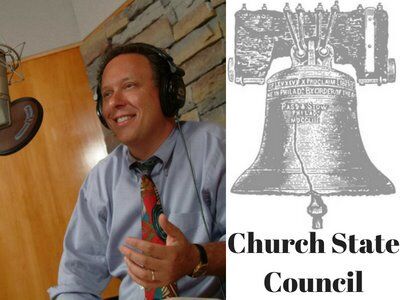Freedom's Ring

Religious Liberty is the freedom to think and to act according to the dictates of conscience, whether individually or in concert with others. Historically, this freedom is rare.
Throughout history, nations have frequently enforced religious uniformity, and punished those who believe and worship differently. In the past century, religious intolerance has expanded to nations where secular ideologies such as Nazism, Fascism, or atheistic socialism hold sway. The separation of church and state, properly understood, prevents government from exercising authority over the consciences of its citizens, protecting religious liberty.
Our Founding Fathers understood the importance of protecting the rights of conscience. They stood in the Protestant tradition, which centuries earlier had insisted that: “in matters of conscience, the majority has no power.” Government was not to mandate truth. They held that all men were “created equal,” each possessing certain “inalienable rights” that were “given by God.” First among the Bill of Rights was Religious Liberty: “Congress shall make no law respecting an establishment of religion, or prohibiting the free exercise thereof.”
The First Amendment requires government to stay out of the business of religion, neither promoting nor interfering with religious activities or institutions. It guarantees people of all faiths the right to worship freely, ensuring that religion is voluntary, not coerced. No one is to dictate the will of God for another.
Seventh-day Adventists, consistent with these founding principles of American religious freedom, believe the God of Love does not force anyone to worship Him. Instead, He desires a relationship that flows from a loving response to the gift of His son, Jesus Christ. Since God does not force worship, neither does the state possess any right to intrude upon the sacred relationship between the Creator and His creatures, whether for religious or secular reasons.
Show Links:
About Alan J. Reinach
Alan J. Reinach is Executive Director of the Church State Council, the religious liberty educational and advocacy arm of the Pacific Union Conference of Seventh-day Adventists, representing five western states: Arizona, California, Hawaii, Nevada and Utah. He is a member of the New York and California Bars. His legal practice emphasizes First Amendment religious freedom cases, and religious accommodation cases under Title VII of the Civil Rights Act of 1964 and related state civil rights laws. He is in demand as a lecturer on First Amendment and religious discrimination issues.
Reinach is also a Seventh-day Adventist minister who speaks regularly on religious freedom topics, and is the host of a nationally syndicated weekly radio broadcast, Freedom’s Ring, devoted to religious liberty issues. He is the principal author and editor of Politics & Prophecy: the battle for religious liberty and the authentic gospel.
Prior to coming to the Church State Council in 1994, Reinach practiced law in White Plains, New York and in New York City.
Reinach is a graduate of the University of North Carolina, Chapel Hill School of Law in 1987, and of the State University of New York at New Paltz, with special honors in history, in 1984.


